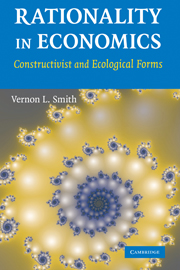Book contents
- Frontmatter
- Contents
- Preface
- Acknowledgments
- Introduction
- PART I RATIONALITY, MARKETS, AND INSTITUTIONS
- PART II IMPERSONAL EXCHANGE: THE EXTENDED ORDER OF THE MARKET
- PART III PERSONAL EXCHANGE: THE EXTERNAL ORDER OF SOCIAL EXCHANGE
- 9 Emergent Order without the Law
- 10 The Effects of Context on Behavior
- 11 Investment Trust Games: Effects of Gains from Exchange in Dictator Giving
- 12 Reciprocity in Trust Games
- PART IV ORDER AND RATIONALITY IN METHOD AND MIND
- References
- Index
11 - Investment Trust Games: Effects of Gains from Exchange in Dictator Giving
Published online by Cambridge University Press: 18 May 2010
- Frontmatter
- Contents
- Preface
- Acknowledgments
- Introduction
- PART I RATIONALITY, MARKETS, AND INSTITUTIONS
- PART II IMPERSONAL EXCHANGE: THE EXTENDED ORDER OF THE MARKET
- PART III PERSONAL EXCHANGE: THE EXTERNAL ORDER OF SOCIAL EXCHANGE
- 9 Emergent Order without the Law
- 10 The Effects of Context on Behavior
- 11 Investment Trust Games: Effects of Gains from Exchange in Dictator Giving
- 12 Reciprocity in Trust Games
- PART IV ORDER AND RATIONALITY IN METHOD AND MIND
- References
- Index
Summary
Of all the persons … whom nature points out for our peculiar beneficence, there are none to whom it seems more properly directed than to those whose beneficence we have ourselves already experienced. Nature, … which formed men for their mutual kindness, so necessary for their happiness, renders every man the peculiar object of kindness, to the persons to whom he himself has been kind. … No benevolent man ever lost altogether the fruits of his benevolence. If he does not always gather them from the persons from whom he ought to have gathered them, he seldom fails to gather them, and with a tenfold increase, from other people. Kindness is the parent of kindness.
A. Smith (1759; 1982, p. 225)But what will explain the explanation?
Krutch (1954, p. 148)A Celebrated Two-Stage Dictator Game
Berg et al. (1995, hereafter BDM) made an important and widely influential modification of the dictator game that explicitly introduced a key characteristic of personal social interactions: gains from “exchange.” Their investment trust two-stage dictator game also uses a double blind (most comparable to the HMSS Double Blind 2) protocol: Dictators in room A send any portion of their $10 (0 to $10) to their random counterpart in room B. People in both rooms know that if $x is sent by anyone, it is tripled, so that the counterpart receives $3x. Thus, the most generous offer, $10, yields a gain to $30.
- Type
- Chapter
- Information
- Rationality in EconomicsConstructivist and Ecological Forms, pp. 234 - 244Publisher: Cambridge University PressPrint publication year: 2007



